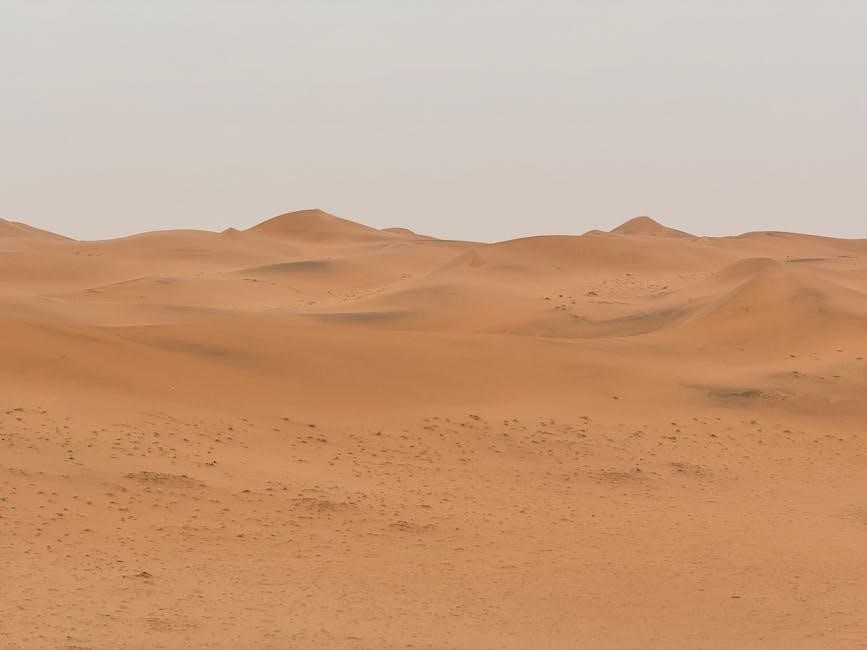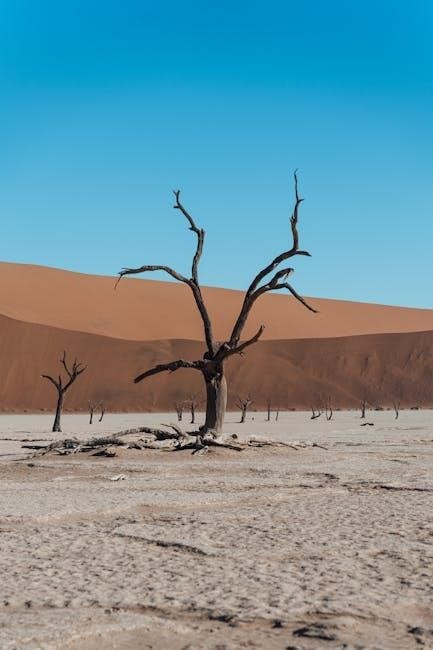Frank Herbert’s Dune is a landmark science fiction novel, exploring themes of ecology, politics, and destiny. Available in PDF, it introduces readers to the desert planet Arrakis and its significance.
Background and Publication History
Frank Herbert’s Dune was first published in 1965, revolutionizing science fiction with its intricate world-building and philosophical depth. The novel began as a serialized story in Analog Magazine before being released as a full book. Its success led to the creation of five additional novels by Herbert, forming the original Dune Chronicles. After Herbert’s death, his son Brian Herbert and co-author Kevin J. Anderson expanded the series using Frank’s notes, resulting in prequels, sequels, and spin-offs. Today, the series spans multiple generations and mediums, including graphic novels and films. The original Dune is widely available in PDF format, allowing readers to explore the iconic story of Arrakis and its ecological and political struggles. The Dune saga remains a cornerstone of science fiction, blending ecology, religion, and politics in a timeless narrative.
Frank Herbert’s Vision and Inspiration
Frank Herbert’s vision for Dune was deeply influenced by his fascination with ecology, politics, and human evolution. Drawing inspiration from real-world desert environments and the dynamics of power, Herbert crafted a universe where the desert planet Arrakis became the focal point of interstellar conflict. His personal experiences, including his interest in psychology and philosophy, shaped the novel’s complex characters and themes. Herbert’s inspiration also stemmed from his work as a journalist, where he explored environmental issues and the exploitation of resources. These elements coalesced into a groundbreaking narrative that transcended traditional science fiction, offering a profound exploration of humanity’s relationship with nature and power. The Dune series, now widely available in PDF format, remains a testament to Herbert’s visionary storytelling and intellectual depth, continuing to captivate readers worldwide with its timeless relevance and richly detailed world-building.
The Plot of Dune
Set on Arrakis, Paul Atreides uncovers a conspiracy and embraces his destiny to lead a rebellion over the spice, shaping the future of humanity and its survival.
The Setting: The Desert Planet Arrakis
Arrakis, a harsh desert planet, serves as the central setting of Dune. Known for its extreme temperatures and arid environment, it is the only source of the rare and valuable spice melange. The planet’s ecosystem is dominated by giant sandworms, which are integral to the spice cycle. Indigenous Fremen have adapted to this unforgiving world, developing a deep understanding of its ecology and harnessing its resources. Arrakis’s unique environment shapes the lives of its inhabitants and drives the political and economic conflicts central to the story. Its desolate landscape and scarce water resources underscore themes of survival and environmentalism. The planet’s dual role as both a hostile wilderness and a cradle of life highlights its significance in Frank Herbert’s universe. Arrakis is not just a backdrop but a living, breathing character in the narrative.
The Protagonist: Paul Atreides and His Destiny
Paul Atreides, the young heir of House Atreides, is the central protagonist of Dune. Born into a noble family, Paul is thrust into a perilous destiny after his family’s betrayal on Arrakis. His journey transforms him from a privileged noble into a messiah-like figure, known as Muad’Dib, revered by the Fremen. Paul’s unique abilities, including prescience and heightened awareness, are shaped by his mother’s Bene Gesserit training and his exposure to the spice melange. His destiny intertwines with the ecological and political struggles of Arrakis, as he leads the Fremen in a rebellion against oppressive forces. Paul’s transformation explores themes of leadership, prophecy, and the complexities of power. His story is a mythic tale of survival, adaptation, and the fulfillment of a greater purpose, making him one of science fiction’s most iconic characters.
The Conflict: The Struggle for Control of the Spice
The heart of Dune’s narrative lies in the struggle for control of the spice melange, a rare and highly valuable resource found only on Arrakis. The spice enhances cognitive abilities, fuels interstellar travel, and is essential for the survival of noble houses and the Imperium. The ruling powers, including the Emperor, the Great Houses, and the Spacing Guild, are deeply dependent on it. The Atreides and Harkonnens, bitter rivals, are drawn into a deadly conflict over the spice’s control. Betrayal, sabotage, and open warfare erupt as each faction seeks to dominate the spice trade. The Fremen, native to Arrakis, also play a crucial role, as their deep understanding of the desert and its ecology could shift the balance of power. This struggle for the spice drives the political intrigue and ecological themes central to the novel, highlighting the dangerous interplay of power and resource dependency.

Major Themes in Dune
The novel explores themes of ecology, religion, politics, and human evolution, set against the backdrop of a desert planet and its valuable spice melange.
Ecology and Environmentalism
Frank Herbert’s Dune emphasizes ecological balance and environmental stewardship, particularly through the desert planet Arrakis. The native Fremen people have a deep connection to the land, understanding the delicate water cycle and the importance of preserving it. The novel highlights the consequences of exploiting natural resources, as seen with the spice melange, which is vital to the universe but extracted at great cost to Arrakis’ ecosystem. Herbert explores themes of terraforming and the long-term effects of human activity on the environment. The Fremen’s efforts to transform Arrakis into a lush world underscore the possibility of restoration but also the challenges of altering nature. This focus on ecology and environmentalism makes Dune a timeless commentary on humanity’s relationship with the planet, resonating with modern concerns about sustainability and climate change.
Religion and Prophecy
Religion and prophecy are central themes in Dune, with Paul Atreides becoming the messianic figure Muad’Dib. The Fremen, indigenous to Arrakis, believe in a prophet who will lead them to freedom. Paul’s visions and abilities align with their expectations, shaping his destiny. The Bene Gesserit, through their breeding program, sought to create a super-being, influencing the course of human evolution. The novel critiques religious manipulation and the dangers of blind faith, while exploring how prophecy can inspire and control. The intersection of religion and politics is a key element, as factions vie for power using spiritual narratives. Frank Herbert’s portrayal of a messiah figure challenges traditional notions of heroism and divine purpose, offering a complex exploration of belief and its impact on humanity. This theme resonates deeply, making Dune a thought-provoking commentary on religion’s role in shaping societies and destinies.
Politics and Power Struggles
The struggle for control of the spice, a rare and valuable resource, drives the political intrigue in Dune. Noble houses, the Emperor, and the Great Houses vie for dominance, with alliances and betrayals shaping the narrative. The ruling class manipulates power through economic and military means, while the native Fremen resist oppression. Paul Atreides’ rise as a leader disrupts this balance, challenging the existing hierarchy. The novel explores how political systems exploit resources and indigenous populations, highlighting the dangers of unchecked ambition. Frank Herbert’s depiction of interplanetary politics critiques authoritarianism and colonialism, offering a nuanced view of power dynamics. The intricate web of alliances and rivalries underscores the theme of politics as a deadly game, where survival often depends on cunning and control. This theme remains central to the series, reflecting real-world struggles for authority and resources.
Human Evolution and Adaptation
In Dune, Frank Herbert explores human evolution through adaptation to extreme environments and technological advancements. The native Fremen of Arrakis develop physiological traits like water retention and heightened senses to survive the desert. Their culture and biology are shaped by millennia of harsh conditions, reflecting a deep connection to their ecosystem. The protagonist, Paul Atreides, undergoes a transformative journey, evolving into the messiah figure Muad’Dib. His abilities, enhanced by the spice, symbolize humanity’s potential for rapid evolution under pressure. The novel also delves into the ethical implications of genetic manipulation and the blending of human and machine. Herbert’s vision of evolution is not just biological but also psychological and societal, emphasizing resilience and adaptation as keys to survival. This theme resonates throughout the series, highlighting humanity’s capacity to thrive in the most inhospitable environments.
Key Characters in Dune
Dune features iconic characters like Paul Atreides, Lady Jessica, and the Fremen, each playing pivotal roles in the struggle for Arrakis and the spice’s destiny in PDF format.
Paul Atreides: The Messiah of Arrakis
Paul Atreides is the central protagonist of Dune, a young noble destined to become the messiah of Arrakis. Born into House Atreides, Paul’s life is forever changed when his family is betrayed. Forced into exile, he discovers his latent abilities as a Bene Gesserit and his prescience powers. The Fremen, native to Arrakis, embrace him as their prophesied leader, Muad’Dib. Paul’s journey from a sheltered heir to a revolutionary leader explores themes of destiny, power, and the complexities of prophecy. His transformation shapes the political and ecological landscape of Arrakis, making him one of science fiction’s most iconic characters. Available in PDF, Dune delves deeply into Paul’s psychological and philosophical evolution.
Lady Jessica: The Bene Gesserit and Her Role
Lady Jessica is a central figure in Dune, serving as the Bene Gesserit concubine of Leto Atreides and the mother of Paul. Trained in the intricate ways of the Bene Gesserit, she possesses advanced mental and physical abilities, including the power of voice control. Her role extends beyond her family, as she is deeply embedded in the political intrigue of the noble houses. Jessica’s decision to bear a son, despite Bene Gesserit orders to produce a daughter, sets the stage for Paul’s destiny. Her influence on Paul’s upbringing and her own internal conflicts between loyalty and duty make her a complex and pivotal character. Available in PDF, Dune explores her multifaceted personality and her crucial impact on the story’s unfolding events.
The Fremen: Indigenous People of Arrakis
The Fremen are the native inhabitants of the desert planet Arrakis, where the rare and valuable spice melange is found. Deeply connected to the ecology of their harsh environment, they have developed unique survival skills and a profound understanding of the planet’s ecosystem. Living in hidden sietches, the Fremen are a fiercely independent and resourceful people, relying on water conservation techniques and stillsuits to survive. Their culture is rich in tradition and prophecy, with a strong emphasis on oral storytelling and religious beliefs. The Fremen play a pivotal role in the story of Dune, as they become allies to Paul Atreides and instrumental in his rise to power. Their deep connection to Arrakis and its sandworms makes them central to the spice trade and the political struggles of the Dune universe. Available in PDF, the novel delves into their intricate society and significance.

The World of Dune
Arrakis, a desert planet, is the central setting, where the rare spice melange is found. Its harsh environment shapes the ecology and politics of this complex, interconnected world;
The Planet Arrakis: Its Ecology and Inhabitants
Arrakis, a harsh desert planet, is the primary setting of Dune. Known for its extreme heat and lack of water, it is home to giant sandworms and the native Fremen. The planet’s unique ecosystem revolves around the spice melange, a rare and valuable resource found only on Arrakis. The spice is integral to interstellar travel and commerce, making Arrakis a focal point of political and economic power struggles. The Fremen, adapted to the planet’s extreme conditions, have developed a deep understanding of its ecology and play a pivotal role in its history. Their connection to the land and its creatures, such as the sandworms, is central to the story’s themes of survival and environmental balance. The harsh environment shapes both the inhabitants and the narrative, creating a world of complexity and intrigue.
The Fremen Culture and Their Significance
The Fremen are the indigenous inhabitants of Arrakis, deeply connected to the planet’s ecology and culture. Their society is rooted in survival instincts, water conservation, and a profound understanding of the desert environment. Fremen culture is characterized by strict traditions, communal living, and a deep spiritual connection to the land. They possess unique knowledge of the sandworms and the spice, which grants them a central role in the planet’s economy. Their resistance to outsiders and imperial rule makes them a pivotal force in the story. The Fremen’s ecological wisdom and warrior ethos highlight their significance as both guardians of Arrakis and key players in its political destiny. Their culture is a cornerstone of Dune’s themes of adaptation, survival, and rebellion, making them one of the most compelling aspects of the series.

Adaptations and Sequels
Dune has spawned various adaptations, including movies, graphic novels, and a forthcoming video game. Sequels by Brian Herbert and Kevin J. Anderson expand the universe, enriching its legacy.
The Dune Movie Franchise and Its Reception
The Dune movie franchise has captivated audiences with its visually stunning adaptations. Denis Villeneuve’s 2021 film received critical acclaim for its faithful portrayal of Frank Herbert’s novel, blending intricate politics and epic visuals. The movie’s success led to the announcement of Dune: Part Two, which promises to continue the story of Paul Atreides and the spice wars. Fans and critics alike have praised the franchise for its commitment to the source material’s depth and complexity. The films have also introduced the Dune universe to a new generation, sparking renewed interest in the original book and its sequels. The franchise’s reception underscores the timeless appeal of Herbert’s vision and its ability to transcend mediums.
Sequels and Prequels in the Dune Series
Frank Herbert’s Dune series expanded significantly, with six original books authored by him. These include Dune Messiah, Children of Dune, God Emperor of Dune, Heretics of Dune, and Chapterhouse: Dune. After his death, his son Brian Herbert and co-author Kevin J. Anderson continued the saga, creating prequels and sequels based on Frank’s notes. These works explore the universe’s history, delving into the rise of House Atreides and the origins of the Fremen. The Legends of Dune trilogy and Prelude to Dune series provide deeper insights into the backstory, while Sequels like Dune: The Butlerian Jihad expand the timeline. These books enrich the Dune universe, offering fans a broader understanding of its intricate world and themes.

Graphic Novels and Other Media Adaptations
Fans of the Dune series can explore its universe through various adaptations. Graphic novels, such as those by Brian Herbert and Kevin J. Anderson, visually bring the story to life. Additionally, an upcoming video game, Dune: Awakening, offers an open-world survival experience, immersing players in Arrakis’ harsh environment. These adaptations complement the original books, providing new ways to engage with the series’ rich lore and themes. They cater to both long-time fans and newcomers, ensuring the Dune legacy endures across different media platforms. These adaptations, including PDF versions of the original novel, make the series accessible to a wide audience, ensuring its continued relevance and popularity in modern times.

The Dune Book in PDF Format

The Dune book is widely available in PDF format, offering readers the original novel, appendices, and an afterword by Brian Herbert, accessible through various eBook platforms.
Downloading the Original Novel
The original Dune novel by Frank Herbert is widely available in PDF format, allowing readers to access the classic tale of Paul Atreides and the desert planet Arrakis. Many eBook platforms, such as LitRes and Penguin Random House, offer legal downloads of the book. The PDF edition typically includes the full text of the novel, along with appendices and an afterword by Brian Herbert, providing deeper insights into the world of Dune.
Fans can download the PDF directly from official sources, ensuring they receive a high-quality, complete version of the book. This format is ideal for readers who prefer digital access, making it easy to carry and read on various devices. The availability of Dune in PDF has made it more accessible than ever, introducing new generations to Herbert’s groundbreaking work.
Availability of Sequels and Related Books in PDF
Beyond the original Dune, fans can access sequels and related books in PDF format, expanding their journey through the universe created by Frank Herbert. Titles like Dune Messiah, Children of Dune, and God Emperor of Dune are available for download, offering continuations of Paul Atreides’ story and beyond. Additionally, books authored by Brian Herbert and Kevin J. Anderson, such as Mentats of Dune, provide further explorations of the series’ rich lore. These PDF editions are accessible through platforms like LitRes and other eBook services, ensuring readers can seamlessly transition between books. The convenience of digital formats allows fans to delve into the entire Dune saga, exploring its intricate world-building and themes without interruption.
Dune remains a timeless masterpiece, with its themes of ecology and human evolution resonating deeply. Available in PDF, the novel and its sequels continue to captivate readers globally.
The Legacy of Dune in Science Fiction
Dune has profoundly shaped science fiction, influencing countless works across literature, film, and gaming. Its exploration of ecology, politics, and religion set a new standard for depth and complexity. The novel’s intricate world-building and philosophical themes have inspired authors and creators globally. Available in PDF, Dune continues to be a foundational text, offering readers a rich, immersive experience that explores humanity’s future and the environment. Its enduring popularity underscores its relevance, ensuring Frank Herbert’s vision remains a cornerstone of the genre.
Why Dune Remains Relevant Today
Dune’s timeless themes resonate strongly in contemporary society. Its focus on environmentalism, political intrigue, and human adaptation mirrors current global challenges. The struggle for resources, particularly the spice, parallels modern concerns over energy and sustainability. Available in PDF, the book offers a cautionary tale about exploitation and the importance of ecological balance. Its exploration of prophecy and leadership also speaks to modern discussions on power and governance. As a cultural touchstone, Dune continues to inspire new adaptations, ensuring its relevance across generations. Its enduring appeal lies in its ability to blend complex ideas with compelling storytelling, making it a must-read for both sci-fi fans and anyone interested in exploring deeper societal issues.
